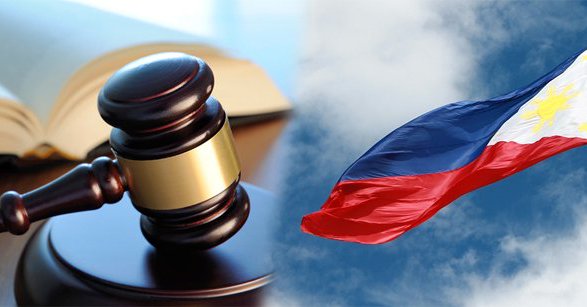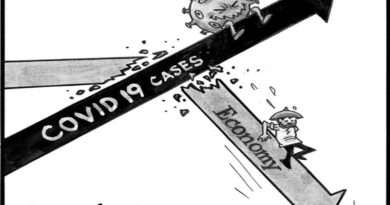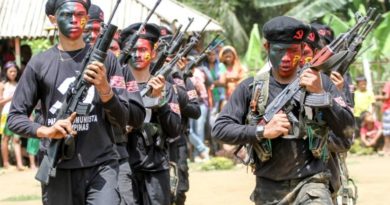OP-ED OPINION: ‘How will the judges be judged?’ Column by Francisco S. Tatad
OPINION ON PAGE ONE
IN the Requiem Mass said on All Souls Day, we normally hear the Latin hymn which describes the Last Judgment:
Dies irae, dies illa
Solvet saeclum in favilla
Teste David cum Sibylla
Quantus tremor est futurus
Quando judex est venturus
Cuncta stricte discussurus!
(The day of wrath, that day will dissolve
the world in ashes
As foretold by David and
the Sibyl [the prophetess]:
How much tremor there will be when
the Judge will come investigating everything strictly!)
.
This hymn is variously attributed to St. Gregory the Great (d. 604), Saint Bernard of Clairvaux (1090-1153), Saint Bonaventure (1221-1274), the Franciscan Thomas of Celano (1200-1265), and the lector Latino Malabranca Orsini (d. 1254) at the Dominican stadium at Santa Sabine, forerunner of the Pontifical University of St. Thomas Aquinas or the Angelicum in Rome. It is one of the most profoundly moving Catholic hymns which draw our hearts and minds to the Last Things.
They played God
I have not heard this hymn in a little while. But for some strange reason, I suddenly, mysteriously heard it playing inside my ear on Friday, May 11, 2018. On that day, eight justices of the Supreme Court arrogantly played God and claimed, in obedience to President Rodrigo Duterte’s stern orders, a right they did not have, to declare Chief Justice Maria Lourdes Sereno “disqualified from and guilty of unlawfully holding and exercising the office of Chief Justice” during the last five years.
Five of the justices had become Sereno’s accusers when they appeared before the House committee on justice to support an impeachment complaint against her, and four of them are appointees of the President who had proclaimed Sereno as his “enemy” and asked for her immediate ouster.
Every ruling of the high court is supposed to add to the law, not diminish or degrade it. However, as a plain citizen, I cannot in conscience bow to the validity of this particular ruling. Even if all 14 other justices had ruled to oust the Chief Justice, I would have to beg off from joining the bandwagon. What makes a law valid is not the number of those who have enacted it, but the undeniable quality of justice. The law must be just. Such a law would be valid whether promulgated by one or by many, in a democracy or in a totalitarian order, while an unjust law can never be valid, whether promulgated by a landslide democratic majority, or without a single dissenting voice in a totalitarian order.
The Court vs its members
The late Alan F. Paguia (1954-2015), a formidable lawyer and professor of law, who was suspended by the Supreme Court for eight years for asking the justices some uncomfortable questions on the 2001 ouster of former President Joseph Ejercito Estrada, used to argue that the justices do not always represent the Supreme Court even in their majority decisions. When they speak according to the Constitution, they do; when they speak for themselves alone, they don’t.
Within that context, we will have to ask whether Associate Justices Teresita de Castro, Lucas Bersamin, Francis Jardeleza, Samuel Martires, Andres Reyes Jr., Alexander Gesmundo and Noel Tijam are speaking for the court or for themselves alone in their quo warranto ruling. Their violation of the Constitution is as clear as the clearest glass and not all their fallacious arguments are able to muddle it.
The basic and all-encompassing issue is jurisdiction. The Supreme Court as court and the justices as justices do not have the right, the duty or the power to try and remove an impeachable Chief Justice, especially one who is already under impeachment, by any other means than that of impeachment by the House of Representatives and conviction by no less than two-thirds of all the members of the Senate, sitting as an impeachment court.
A cowardly response
The offending justices acquired the right, the duty and the power to try their own Chief Justice not from the Constitution or any law, but from a president gone mad who had barked his order against the Chief Justice, whom he wanted destroyed. In cowardly acquiescence, the justices decided to become his proxy and surrogate in his fight against the respondent.
Justices do not have the duty nor the competence to review the validity of the President’s appointment of any SC justice. Such power of review was once reposed in the Commission on Appointments; it now resides in the Judicial and Bar Council, which recommends all judicial appointments. Once appointed, and qualified into office, justices may be removed only on impeachment for, and conviction of, culpable violation of the Constitution, treason, bribery, graft and corruption, other high crimes or betrayal of public trust.
The House committee on justice has already voted to impeach Sereno. But the process stopped when it became clear that there were not enough votes in the Senate to convict the respondent. So, Solicitor General Calida led the charge by filing a quo warranto suit, and the eight justices dutifully fell in line. It is not too late to ask the justices if they would have done what they did if DU30 had not gone on a rampage against the Chief Justice. So, I am asking the question now.
False precedents
In a foolish attempt to defend the indefensible, Tijam’s ponencia invokes two false precedents to justify the justices’ action: the quo warranto petition filed against Gloria Macapagal Arroyo in 2001 after she assumed the presidency following the judicially assisted coup against Estrada, and the quo warranto petition against Commission on Audit Chair Reynaldo Villar in 2008. These are false precedents because they are not on all fours with the quo warranto petition against Sereno.
In the petition against Arroyo, the question sought to be resolved was whether she had taken her oath as President, as she claimed, when she took over from Estrada, or merely as “Acting President,” as Estrada’s camp claimed. There was no effort to remove Arroyo. In the case of Villar, the question sought to be resolved was whether he could serve for seven years as COA chair after he had served for four years as member of the COA. There was no move to remove Villar.
In both cases, there was no question of the quo warranto petitions being filed after the one year-period had expired, from the time the cause of action arose, as required by the Rules of Court. In Sereno’s case, the one-year reglementary period expired in 2013.
Flawed argument
The ponencia further argues that Rule 16 of the 2010 Rules of the Presidential Electoral Tribunal provides that “a verified petition for quo warranto contesting the election of the President or Vice President on the ground of ineligibility or disloyalty to the Republic of the Philippines may be filed by any registered voter who has voted in the election concerned within ten (10) days after the proclamation of the winners.” This, in the ponente’s view, serves to point out that if a President and a Vice President, who are both impeachable officers, could be subjected to a quo warranto proceeding, why not a Chief Justice?
The argument is flawed. Someone who has been proclaimed president or vice president 10 days ago is only a president-elect or a vice president- elect, and not yet an impeachable officer who may be subjected to impeachment; he may be subjected to quo warranto only.
More flawed analogies
Outside of Tijam’s extended ponencia, a distinguished advocate argues that supposing the President appoints an incompetent bar flunker as chairman of the Commission on Elections, will he Supreme Court be prevented from hearing a quo warranto petition against him or her? The construction is materially flawed.
In the case of the hypothetical Comelec chair, the language of Constitution is precise: the President shall nominate, and, with the consent of the Commission on Appointments, appoint a chair of the Comelec. If in spite of this screening process an incompetent bar flunker is appointed as Comelec chair, then the Commission on Appointments should be held accountable, if not the President himself.
Tijam’s ponencia argues that when Article XI, Section 2 of the Constitution says, “The President, the Vice President, and the Members of the Supreme Court, the Members of the Constitutional Commissions, and the Ombudsman may be removed from office, on impeachment for, and conviction of, culpable violation of the Constitution, treason, bribery, graft and corruption, other high crimes, or betrayal of public trust,” the use of the word “may” means quo warranto action may be used against an impeachable officer. The word “may” denotes discretion and admits of an alternative mode of effecting an impeachable officer’s removal, the ponencia says; ergo, quo warranto action is authorized.
Non sequitur
The word “may” simply means that the officers so named who all have a fixed term of office may still be removed on impeachment for, and conviction of, specific crimes, with the concurrence of at least two-thirds of all the members of the Senate, sitting as an impeachment court. If the Constitution had meant to authorize their removal by quo warranto, on grounds lesser than those required for impeachment, it would have said so categorically and clearly. And it would have specified the number of votes needed to nullify an impeachable officer’s right to his office. But the Constitution did not and does not.
Balderdash
Much of Tiijam’s ponencia is balderdash. We may be able to overlook that offense, except that unless the abominable ruling is changed, there would be no appeal from it. We are sure to enter a period of legal chaos. The people will have to judge the justices. Physical challenges to political authority will rise, even the physical safety of justices could be at risk. And some people may want to apply the quo warranto reasoning of the eight justices on the moral, intellectual and mental fitness of our strongman-president. The withdrawal of allegiance by the military to their Commander in Chief may no longer be a taboo subject.
I did not see the puffed-up faces of the justices as they pronounced their verdict. But their ruling transported me, as I said in the beginning, to an eerie world where I saw their corrupted bodies curled on the wreckage of our Constitution and the Supreme Court while an all-powerful judge pronounced his sentence on our mortal justices. Clearly it was a fantasy, or a trance. But I suspect my conscience was trying to assure me that despite the obscene hosannas from the rented crowds and the lack of offended justice from the various faiths and the constitutionally upright, no one gets away with an injustice as gross and as life-threatening as this. In the end, justice will have to be restored. As Christians and as Filipinos, we have to believe in it. We will have to work on it.
IN MEMORIAM. I was deeply saddened to learn that while I was on a brief trip abroad, my dear friend, the National Artist for literature Cirilo F. Bautista passed away after a lingering illness at 76. He was a poet par excellence and was richly loved both for himself and for his poems. We first met at the University of Santo Tomas where, as literary editor of the Varsitarian, I had the privilege of publishing his prize-winning poems. He was already a giant oak presiding over a forest of gentle saplings even then. Some of his best Varsitarian friends had preceded him on this journey home—Benjamin Afuang, Ophelia Dimalanta, Bayani Mendoza de Leon, and Jose “Papen” Flores. I ask the gentle reader to pray for the repose of their souls. Thank you very much.
Former Senate President Edgardo Angara, 83, joined his Maker yesterday morning after a heart attack. Details about his wake and funeral arrangements will be announced later. Let’s pray for him. Thank you very much./ ON /
All photographs, news, editorials, opinions, information, data, others have been taken from the Internet ..aseanews.net | [email protected] |.For comments, Email to :D’Equalizer | [email protected] | Contributor.










